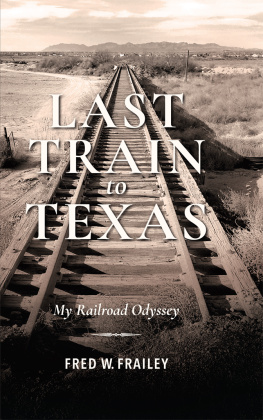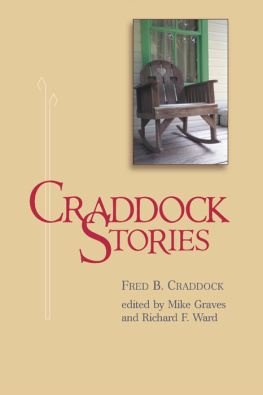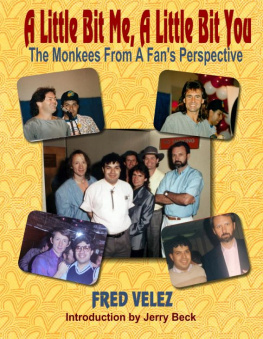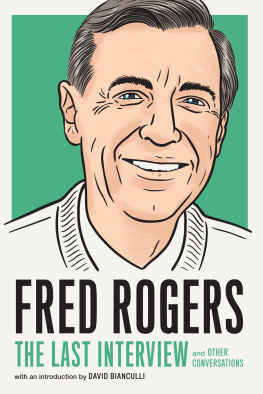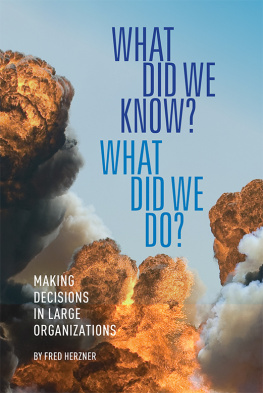Fred W. Frailey - Last Train to Texas
Here you can read online Fred W. Frailey - Last Train to Texas full text of the book (entire story) in english for free. Download pdf and epub, get meaning, cover and reviews about this ebook. year: 2019, publisher: Indiana University Press, genre: Detective and thriller. Description of the work, (preface) as well as reviews are available. Best literature library LitArk.com created for fans of good reading and offers a wide selection of genres:
Romance novel
Science fiction
Adventure
Detective
Science
History
Home and family
Prose
Art
Politics
Computer
Non-fiction
Religion
Business
Children
Humor
Choose a favorite category and find really read worthwhile books. Enjoy immersion in the world of imagination, feel the emotions of the characters or learn something new for yourself, make an fascinating discovery.
- Book:Last Train to Texas
- Author:
- Publisher:Indiana University Press
- Genre:
- Year:2019
- Rating:4 / 5
- Favourites:Add to favourites
- Your mark:
- 80
- 1
- 2
- 3
- 4
- 5
Last Train to Texas: summary, description and annotation
We offer to read an annotation, description, summary or preface (depends on what the author of the book "Last Train to Texas" wrote himself). If you haven't found the necessary information about the book — write in the comments, we will try to find it.
Last Train to Texas — read online for free the complete book (whole text) full work
Below is the text of the book, divided by pages. System saving the place of the last page read, allows you to conveniently read the book "Last Train to Texas" online for free, without having to search again every time where you left off. Put a bookmark, and you can go to the page where you finished reading at any time.
Font size:
Interval:
Bookmark:
Table of Contents
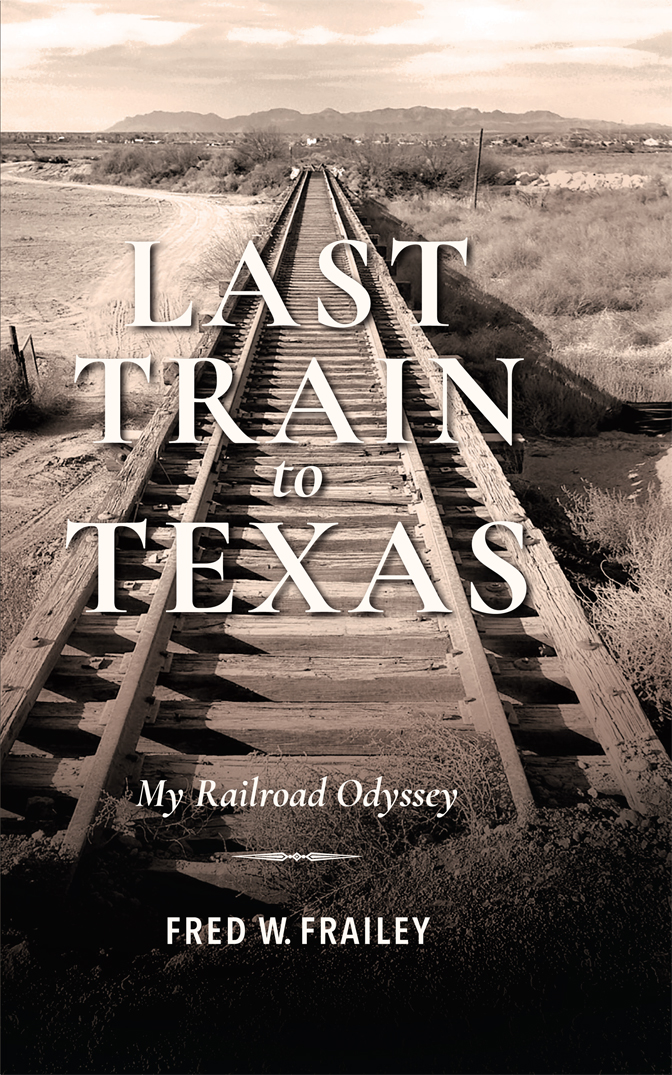


This book is a publication of
Indiana University Press
Office of Scholarly Publishing
Herman B Wells Library 350
1320 East 10th Street
Bloomington, Indiana 47405 USA
iupress.indiana.edu
2020 by Fred Frailey
All rights reserved
No part of this book may be reproduced or utilized in any form or by any means, electronic or mechanical, including photocopying and recording, or by any information storage and retrieval system, without permission in writing from the publisher. The paper used in this publication meets the minimum requirements of the American National Standard for Information SciencesPermanence of Paper for Printed Library Materials, ANSI Z39.48-1992.
Manufactured in the United States of America
Library of Congress Cataloging-in-Publication Data
Names: Frailey, Fred W., author.
Title: Last train to Texas : my railroad odyssey / Fred W. Frailey.
Other titles: Railroads past and present.
Description: Bloomington : Indiana University Press, 2020. | Series: Railroads past and present
Identifiers: LCCN 2019033925 (print) | LCCN 2019033926 (ebook) | ISBN 9780253045249 (hardback) | ISBN 9780253045270 (ebook)
Subjects: LCSH: Frailey, Fred W.Travel. | Railroad travelAnecdotes.
Classification: LCC HE1038.F73 L388 2020 (print) | LCC HE1038.F73 (ebook) | DDC 385.0973dc23
LC record available at https://lccn.loc.gov/2019033925
LC ebook record available at https://lccn.loc.gov/2019033926
1 2 3 4 525 24 23 22 21 20
CONTENTS
FRED FRAILEY AND RAILROADS HAVE been inextricably linked for more than 40 years60 if you count his apprenticeship hanging around railroad depots and yards as a youngster. Its a good thing, too, because for those of us who love this industry, Fred has been a constant source of in- depth analysis, insight, and stories about the people who make our business work, all of which have served to illuminate so much of the change weve seen during his tenure as a writer.
Railroads are a big business, requiring enormous sums of capital (frequently as much as 1820 percent or so of annual revenue). They use huge locomotives and rolling stock that move over vast distances to do the jobs for which theyre required, and they demand extremely skilled professionals to move the trains over the road and to manage the far-flung systems. Making these systems work well is a big job.
Fred has brought together a unique set of skills and talent to keep us, his readers, abreast of the latest changes in the industry. In addition to the sheer size of the industry, it is continually changing, evolving, and redefining itself, often in response to changing regulations, management whims, and market conditions. Fred has been at the forefront of allowing his readers to follow and even to anticipate changes, through his articles, columns, and blogs.
In some ways, though, Fred Frailey is a bit of an enigma. For many of us who grew up in and around the industry, our dream was to work for a railroad and bring energy, vision, and passion into our chosen line of work. Fred, on the other hand, while showing an early passion for railroading, was also influenced by his father, a newspaperman in the old tradition of being ready to find the big story, ask hard and probing questions, and then take his efforts to the public in his own writing style. In that respect, Fred is the proverbial chip off the old block. He has effectively married his passion for railroads and his considerable writing gifts to become one of the United States foremost railroad storytellers.
Since Fred began his professional writing career, he observed dramatic changes in the industry, including the passage of the landmark Staggers Act and the creation of Conrail at a time when many observers believed eastern railroads could have been nationalized. He also had the advantage of growing up in the pre-Amtrak era and observed the creation of Amtrak for contrast.
Fred was able to meet and then later get close on a personal level with many of the influential leaders who were instrumental in not only saving the industry as we know it today but then reinvigorating it. For instance, his chapter about the late Jim McClellan (The World According to McClellan) is on point. McClellan was one of the true visionaries that helped create Conrail and then returned for round two by engineering the subsequent break-up of Conrail, which became parts of Norfolk Southern and CSX respectively. Fred was masterful at distilling from a speech McClellan delivered the pungent conclusions that the speaker reached about the realities of railroading in the twenty-first century.
As a journalist with a natural inquisitiveness, Frailey is quick to pose good and often hard questions in an effort to get below the surface and ask why. This skill takes us places other writers cannot. For example, Freds interview with Rob Krebs (Watch Rob Run) is remarkable for its insight into why the proposed Burlington Northern Santa FeCanadian National (BNSF-CN) merger died stillborn, how Krebs was able to meld two entrenched senior managements from two organizations with vastly different philosophies into one with his merger of Santa Fe and Burlington Northern, and how events in Krebss personal life affected his own management style.
There were countless articles and columns written by many financial writers and others about the BNSF merger, its integration, and then the failed BNSF-CN merger (which would have been a stroke of genius had the merger gone through). No other writer had the sheer force of will or the ability to delve through the mergers many complexities to get to the heart of the matter. Fred used his natural inquisitiveness to take us behind the scenes to understand why certain decisions were made. He gets us behind the person in the blue suit to understand what makes the individual tick. What other writer could have encouraged Rob Krebs to speak so candidly about his son, Duncan? It also was a measure of the man himself, Krebs, who was so open and genuine with Fred. Fred has a way of having that effect on people who know and trust him.
Likewise, Freds chapter on Mike Haverty (Mike Havertys Long Shadow) is a glimpse into the man who many consider to be a genius by not only having big ideas that bring new revenue into the railroad sphere but by implementing them. As Fred so candidly points out in this piece, Mike was among the last of the breed of class 1 CEOs to come from the operating ranks. (Mike began his career as a brakeman.) The industry is in desperate need of the next Mike Haverty and Rob Krebs.
More than just analyzing railroads and their operations, Fred also enjoys riding trains. His philosophy of having no concerns about how late his train may be is a testament to his unbridled enthusiasm for just being able to live in the moment.
I met Fred at a small reception in Chicago of senior railroad officials more than a decade ago, and I found him to be one of those rare, larger-than-life figures. We got into a conversation about railroads and other worldly matters, and that conversation has been going on ever since. As a youth, I grew up greatly admiring and being influenced by the writing of David P. Morgan, who stood alone among writers of the day and who made
Next pageFont size:
Interval:
Bookmark:
Similar books «Last Train to Texas»
Look at similar books to Last Train to Texas. We have selected literature similar in name and meaning in the hope of providing readers with more options to find new, interesting, not yet read works.
Discussion, reviews of the book Last Train to Texas and just readers' own opinions. Leave your comments, write what you think about the work, its meaning or the main characters. Specify what exactly you liked and what you didn't like, and why you think so.

